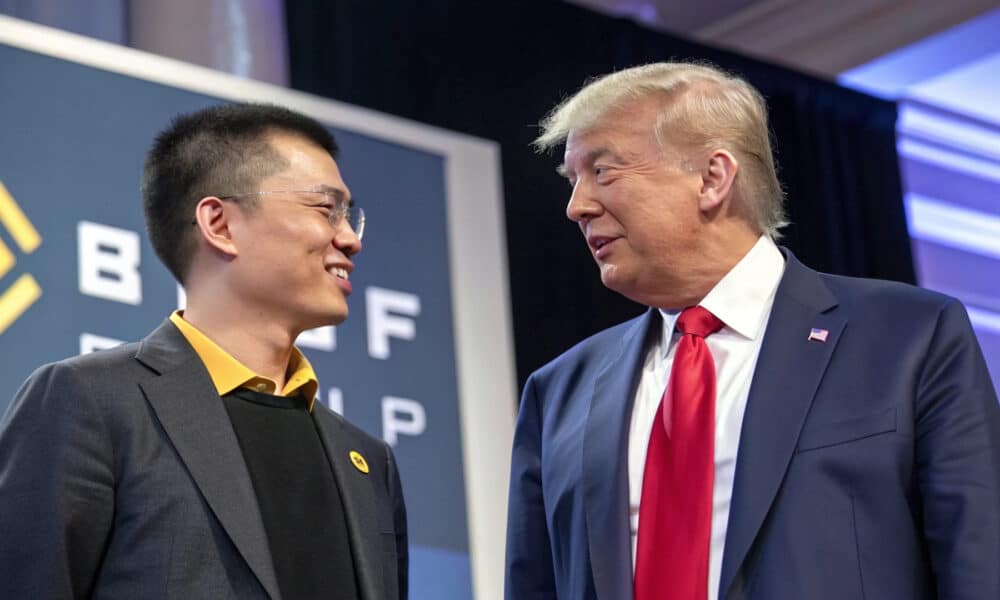Trump-Binance Ties in the Spotlight: An Overview of CZ’s Pardon and Its Implications
The ties between former President Donald Trump and cryptocurrency giant Binance are under renewed scrutiny following Trump’s recent pardon for Changpeng Zhao, commonly known as CZ, the founder of Binance. This surprising political move has reignited discussions about potential political influence and the regulatory landscape surrounding cryptocurrencies in the U.S. The undeniable impacts of this pardon extend well beyond Zhao’s personal freedom, as it raises questions about the political dynamics influencing the cryptocurrency market and regulatory fairness.
The Pardon and What It Means for Binance
CZ’s pardon signifies a pivotal moment for both him and Binance. Following his conviction on AML (anti-money laundering) violations, Zhao faced serious restrictions that barred him from holding significant business roles in the U.S. However, this presidential pardon restores his civil rights, potentially allowing him to reclaim leadership at Binance. Reports indicate that Zhao’s legal team had reached out to Trump’s circle with a proposal that allegedly tied the pardon to potential collaborations involving the Trump-backed cryptocurrency venture, World Liberty Financial (WLFI), and projects like the USD1 stablecoin.
This arrangement has raised eyebrows among critics, who suggest that there may be ulterior motives behind the pardon. The implications extend to the broader cryptocurrency marketplace and how favorable regulatory conditions can be obtained through political partnerships. As the digital currency sector continues to evolve rapidly, the intersection of politics and cryptocurrency could shape its future significantly.
The Controversial Claim of Pay-to-Play
Shortly after the pardon, Binance U.S. listed the USD1 stablecoin, which fueled allegations of a “pay-to-play” scheme. Critics, including U.S. Senators Elizabeth Warren and Chris Murphy, highlighted the timing of the listing and criticized the perceived corruption in the exchange of political favors for financial gain. Senator Warren accused CZ of leveraging his financial interests in Trump’s stablecoin project to secure his pardon, calling him a convicted criminal who should not be free to benefit from such dealings.
Despite these criticisms, WLFI’s representatives have categorically denied any wrongdoing, insisting they did not influence the decision-making around Zhao’s pardon. This stark divide in public opinion underscores the complexities of the relationship between political authorities and the cryptocurrency industry, raising questions about the ethics of such interactions.
Reactions from the Crypto Community
The cryptocurrency community is divided on the implications of CZ’s pardon. On one side, many industry leaders support Zhao and view his pardon as a form of justice. David Bailey, a prominent figure in the crypto space, referred to the charges against Zhao as “punitive,” suggesting that the punishment may have been excessive for the offense. The responses reflect contrasting perceptions of justice within a rapidly evolving industry.
On the other side, critics point to the challenges of assuring transparency and integrity in an industry already fraught with skepticism. The calls for accountability from figures like Senators Warren and Murphy resonate within parts of the crypto community, highlighting the ongoing struggle to delineate between legitimate business operations and criminal activities.
The Economic Impact of the Pardon
The economic ramifications of CZ’s pardon are substantial. The endorsement of the USD1 stablecoin, supported by Trump’s venture WLFI, is significant in light of Binance’s market influence. According to reports, WLFI has generated impressive revenue figures, partially attributed to the stablecoin’s performance. The emerging partnership between Binance and WLFI may bring both financial gain and regulatory scrutiny, ultimately affecting investor confidence in cryptocurrencies.
Moreover, with CZ’s ability to reclaim leadership at Binance reinstated, the dynamics of market operations could shift. Strategies could evolve based on political support, which would have ongoing consequences for both regulatory actions and market perceptions within the global cryptocurrency economy.
Future Implications for Binance and the Crypto Landscape
With the pardon in place, the future trajectory of Binance and Changpeng Zhao remains uncertain yet pivotal. The potential for Zhao’s return to leadership could reinvigorate Binance but also heighten regulatory investigations and public scrutiny. As the cryptocurrency landscape becomes increasingly complex, the need for clear regulations is more pressing than ever.
Crypto advocates argue that favorable regulatory frameworks can aid in solidifying the industry’s legitimacy. Conversely, the ongoing concerns about political involvement in cryptocurrency governance raise essential questions regarding the integrity of such frameworks. Investors and market participants will likely remain vigilant as the situation unfolds, anxious to see how these developments will shape the evolving cryptocurrency ecosystem.
Conclusion: A Crossroads for Cryptocurrency Regulation
The recent pardon granted to Changpeng Zhao illustrates the intricate ties between cryptocurrency and politics, raising critical questions about regulatory fairness and the ethical boundaries of political influence. As CZ contemplates his return to Binance leadership, the potential for expanded market presence coexists with the risk of further regulatory scrutiny.
Moving forward, a collaborative approach involving regulatory bodies, industry leaders, and policymakers may be necessary to effectively navigate this complex landscape. The legitimacy of cryptocurrencies hinges on how these discussions evolve and what measures are enacted to prevent the intertwining of political motives and financial markets. The future of Binance, Zhao, and the broader cryptocurrency industry will depend heavily on how these intricate dynamics are balanced in the years to come.


